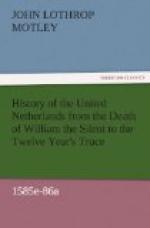There, in close skull-cap and dark flowing gown, was the subtle, monastic-looking Walsingham, with long, grave, melancholy face and Spanish eyes. There too, white staff in hand, was Lord High Treasurer Burghley, then sixty-five years of age, with serene blue eye, large, smooth, pale, scarce-wrinkled face and forehead; seeming, with his placid, symmetrical features, and great velvet bonnet, under which such silver hairs as remained were soberly tucked away, and with his long dark robes which swept the ground, more like a dignified gentlewoman than a statesman, but for the wintery beard which lay like a snow-drift on his ancient breast.
The Queen was then in the fifty-third year of her age, and considered herself in the full bloom of her beauty. Her, garments were of satin and velvet, with fringes of pearl as big as beans. A small gold crown was upon her head, and her red hair, throughout its multiplicity of curls, blazed with diamonds and emeralds. Her forehead was tall, her face long, her complexion fair, her eyes small, dark, and glittering, her nose high and hooked, her lips thin, her teeth black, her bosom white and liberally exposed. As she passed through the ante-chamber to the presence-hall, supplicants presented petitions upon their knees. Wherever she glanced, all prostrated themselves on the ground. The cry of “Long live Queen Elizabeth” was spontaneous and perpetual; the reply; “I thank you, my good people,” was constant and cordial. She spoke to various foreigners in their respective languages, being mistress, besides the Latin and Greek, of French, Spanish, Italian, and German. As the Commissioners were presented to her by Lord Buckhurst it was observed that she was perpetually gloving and ungloving, as if to attract attention to her hand, which was esteemed a wonder of beauty. She spoke French with purity and elegance, but with a drawling, somewhat affected accent, saying “Paar maa foi; paar le Dieeu vivaant,” and so forth, in a style which was ridiculed by Parisians, as she sometimes, to her extreme annoyance, discovered.
Joos de Menin, pensionary of Dort, in the name of all the envoys, made an elaborate address. He expressed the gratitude which the States entertained for her past kindness, and particularly for the good offices rendered by Ambassador Davison after the death of the Prince of Orange, and for the deep regret expressed by her Majesty for their disappointment in the hopes they had founded upon France.
“Since the death of the Prince of Orange,” he said, “the States have lost many important cities, and now, for the preservation of their existence, they have need of a prince and sovereign lord to defend them against the tyranny and iniquitous oppression of the Spaniards and their adherents, who are more and more determined utterly to destroy their country, and reduce the poor people to a perpetual slavery worse than that of Indians, under the insupportable and detestable yoke of the Spanish Inquisition.




